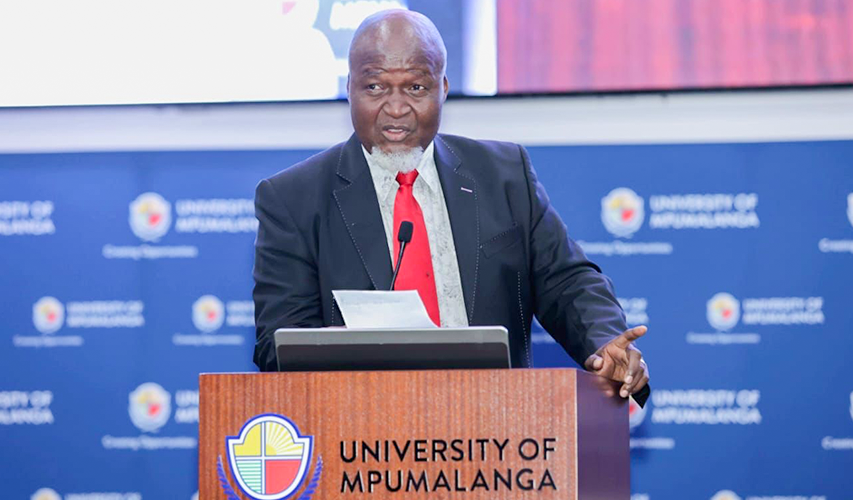Titled: Emotional Intelligence as an Essential Ingredient of an Effective People Management Strategy or Strategies for Effective Implementation of Policies and Good Governance Principles, the seminar was well attended by UMP staff, students, and interested parties who were able to view the livestream online.
Professor Thakhathi, a distinguished academic and leadership coach, has urged leaders and managers to apply emotional intelligence and people management skills for businesses and institutions to succeed and produce great results.
“No matter how things are or escalate, actively listen and use wisdom; understand and apply knowledge to make sound judgements. As leaders, it is important that we manage our emotions to leave people feeling better, motivated and inspired.”
He explained that emotional intelligence is the ability to perceive, use, understand, manage, and handle emotions. People management is about finding solutions and resolving issues and being able to communicate before people explode.
“Emotional intelligence refers to the capacity to be aware of, control, and express one’s emotions and to handle interpersonal relationships judiciously and empathetically.
 Dr Nonzwakazi Maqubela was the Programme Director.
Dr Nonzwakazi Maqubela was the Programme Director.
It is the ability to perceive, interpret, demonstrate, control, evaluate and use emotions to communicate with and relate to others effectively and constructively,” said Professor Thakhath. He went on to mention that emotional intelligence is commonly defined by four attributes:
- Self-management: Being able to manage yourself by controlling impulsive behaviours and feelings; also relating to how you healthily manage your emotions, take initiative, follow through on a commitment, and adapt to change.
- Self-awareness: The ability to recognise your own emotions and how they affect your thoughts and behaviours; also relating to knowing your strengths, weaknesses and being confident.
- Social awareness: Leaders should have empathy and understand the emotions, needs and concerns of other people. They should also be able to pick up emotional cues, feel comfortable socially, and recognise the power dynamics in a group or organisation.
- Relationship management: Leaders or managers should know how to develop and maintain a good relationship. They must also know how to communicate clearly, and inspire and influence others.
Professor Thakhathi further said that there are leaders who do not know how to take criticism. Some have difficulty in understanding it and some don’t take it well.
“Human beings can surprise you. The beauty of the human mind is that once we understand the different personality types, we can manage them. Create a good working environment, feel for others, have good discussions, and encourage feedback. This will result in good mental health, good relationships, and you will also understand situations.”
 Siyabuswa Campus Director, Dr Emmanuel Tshikwatamba, delivered the note of thanks.
Siyabuswa Campus Director, Dr Emmanuel Tshikwatamba, delivered the note of thanks.
Communication and approach
Professor Thakhathi mentioned another useful managerial skill required in a leadership role was people management, which he referred to as the practice of recruiting, training, engaging and retaining people to optimize their talent and maximize their productivity.
He said this essential skill also includes addressing people’s needs, unique talents and career objectives, while supporting their alignment with company goals and values.
“You must make sure that you leave everybody happy and motivated wherever you go. Communicate with your colleagues all the time and don't talk down to them. Communication in the workplace is the key to success. As leaders, academics, and students we must all have skills in how to deal with people. It is essential to apply emotional intelligence and people management skills in the workplace because that’s where people spend most of their time.”
He condemned the situation in which employees treat stakeholders negatively because it drives them away.
 Professor Vusi Gumede introduced the speaker.
Professor Vusi Gumede introduced the speaker.
“You must find a way of dealing with different people within the organisation and make sure that everyone feels at home. Even when dealing with your family, make sure that when you are away they miss you, not that they pray that you must not come back.”
He also highlighted the need to encourage people to approach problems in a very positive way. “For example, when I was still a dean, I used to make sure that when students came to me with problems, I encouraged them to immediately think about the solution instead of focusing on the problem.”
Investing in emotional intelligence is vital
Professor Thakhathi mentioned professional jealousy and that there is no need for competition and conflict in the workplace.
“Some leaders are failing to balance appreciation and critical criticism. Siyabuswa and Mbombela campus can work together. Creating a peaceful dialogue, apply knowledge using the right attitude and don’t take chances with knowledge – know the end and the beginning.”
In closing Professor Thakhathi said people management skills are essential regardless of the size of the organisation.
“Failure to manage your emotional intelligence has detrimental effects on the people you work with and ultimately on the organisation's performance. Leaders must be sensitive when handling organisational conflict. Leaders should invest in building emotional intelligence for their employees for both their health and that of the organisation.”
“As employees are assets of this university, let's leave a good legacy, let's make sure that you all work well together. There is no need for competition. Better leaders remain calm, strike a balance, and self-regulate.”
@ Story by Lisa Thabethe. Pictures ChrisplPhoto.